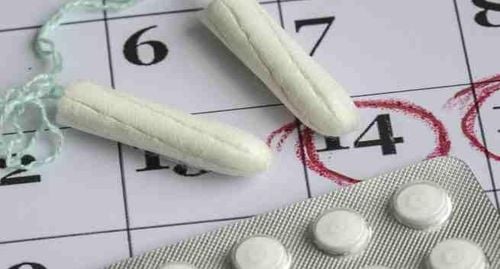This is an automatically translated article.
The article is professionally consulted by Doctor Department of Obstetrics and Gynecology, Vinmec Hai Phong International General Hospital.
Progesterone is a female sex hormone, produced mainly in the ovaries after ovulation occurs. This is an important hormone in maintaining the menstrual cycle and especially in preparing a woman for pregnancy.
Since puberty begins, the ovaries release an egg every month. If fertilization does not occur, the corpus luteum - an endocrine gland responsible for the production of hormones, including progesterone - is disrupted, leading to decreased progesterone levels, to a certain extent that there is no longer enough to maintain Maintains the lining of the uterus causing them to break and form menstruation.
If fertilization occurs, progesterone will continue to thicken the lining of the uterus, stimulating the glands to secrete nutrients to feed the egg and maintain the pregnancy.
1. The role of the hormone progesterone with the body
Progesterone in a woman's body has the following tasks:
Regulate the menstrual cycle; Prepare the lining of the uterus for egg implantation; Maintain uterine lining throughout pregnancy; Prevent ovulation from continuing until the pregnancy ends; Prevents fertilization of more than 1 egg at a time; Prevent uterine contractions, help pregnant mother's cervix always close; Stimulates breast tissue to promote lactation, getting ready for milk production; Strengthens pelvic muscle contractions to prepare for labor. In men, progesterone is produced in small amounts that help with sperm production.

2. What is the normal level of progesterone?
Progesterone levels are relatively low before ovulation and often rise after this process. Progesterone will continue to increase if fertilization occurs or decrease if menstruation occurs.
If progesterone levels do not increase - decrease monthly, this means you are having problems with ovulation, menstruation or both. They can lead to the unfortunate consequence of female infertility.
Women who have had multiple pregnancies or have twins, triplets, etc. often have naturally higher progesterone levels than women who have not had children.
Trắc nghiệm: Bạn có hiểu đúng về dấu hiệu mang thai sớm?
Các dấu hiệu mang thai sớm không phải chỉ mỗi trễ kinh mà còn có rất nhiều dấu hiệu khác như xuất huyết âm đạo, ngực căng tức,… Điểm xem bạn biết được bao nhiêu dấu hiệu mang thai sớm thông qua bài trắc nghiệm này nhé!
3. Why do progesterone levels drop?
Progesterone levels in the blood can decrease due to the following reasons:
Toxemia of pregnancy, pre-eclampsia or late pregnancy; Decreased ovarian function; Amenorrhea ; Ectopic pregnancy; Miscarriage.

4. Why do progesterone levels increase?
Causes of abnormally elevated progesterone can include:
Ovarian cysts ; Unsuccessful pregnancy; A form of ovarian cancer; Progesterone is overproduced by the adrenal glands; Adrenal gland cancer; Congenital adrenal hyperplasia (CAH).
5. Progesterone deficiency phenomenon
5.1 Symptoms of low progesterone Headache or migraine; Changes in mood, including anxiety or depression; Irregular menstrual cycles; Decreased sex drive; Abnormal uterine bleeding in non-pregnant women. 5.2 Is low progesterone dangerous? Progesterone hormone is very important for women during childbirth. Low progesterone levels mean you'll have some trouble getting pregnant. Specifically:
When ovulation occurs, progesterone levels increase, which helps to thicken the uterine wall, ready for egg implantation. Without progesterone, the lining is not thick enough, the egg will not be able to implant and pregnancy will not occur; Pregnant women still need progesterone to maintain the lining of the uterus until the baby is born. The body will continue to produce this hormone and cause normal pregnancy symptoms such as breast tenderness and nausea. If progesterone levels are too low, the uterus may not be able to sustain the growth of the fetus; Progesterone deficiency can increase the risk of an ectopic pregnancy, leading to miscarriage or stillbirth; Without progesterone to supplement, estrogen can become the dominant hormone, causing symptoms such as: Weight gain; Decreased sex drive; Depression; Premenstrual syndrome, irregular menstrual cycle, heavy menstrual bleeding; Cystic fibrosis of the breast; Gallbladder problem.

5.3 What to do when low progesterone? Women with low progesterone levels usually have no symptoms of concern and may not need treatment. However, if you want to have children, you should seek hormone replacement therapy. This therapy helps to increase progesterone levels and thicken the lining of the uterus, increasing the chances of pregnancy and leading to a healthy pregnancy.
Women with menstrual irregularities and abnormal vaginal bleeding can also improve these symptoms by using hormone replacement therapy. For the treatment of severe symptoms of menopause, this therapy often combines estrogen and progesterone, because taking estrogen without progesterone increases the risk of endometrial cancer.
Methods of adding progesterone in hormone therapy include:
Creams and gels: Topical or vaginal use; Suppositories: Often used to treat low progesterone that causes fertility problems; Drug. Hormone therapy is contraindicated in women with a history of:
Breast cancer; Endometrial cancer; Liver failure; Blood clot; Stroke. Using hormone replacement therapy can cause some side effects such as heart attack, stroke, blood clot formation, gallbladder problems, and some types of breast cancer. Therefore, before using this therapy, the patient should consult the doctor carefully.
If you are concerned about the side effects of hormone therapy, you can look to natural measures to increase progesterone such as:
Increase foods rich in vitamins B and C; Eat foods rich in zinc, eg shellfish such as shrimp, clam,...; Manage stress: When under stress, the body produces cortisol instead of progesterone.
6. Progesterone in men

Progesterone is better known as a sex hormone in females, however males also need progesterone to produce testosterone in the adrenal glands and testes. Progesterone levels in men are similar to those of women during the follicular phase preparing to release an egg.
Symptoms of low progesterone in men include:
Decreased sex drive; Hair loss; Weight gain; Tired; Depression; Gynecomastia (gynecomastia in men); Erectile dysfunction ; Impotent; Bone loss; Loss of muscle. Men with low progesterone levels have an increased risk of the following:
Osteoporosis; Arthritis; Prostate cancer ; Bladder neck obstruction. Progesterone levels in men will begin to decline as men age. Progesterone plays an important role in the health of both men and women, especially greatly affecting the fertility of women. When you notice any signs of low progesterone in the body, especially if you are trying to have a baby, you should see a doctor soon to determine your condition and take timely intervention.
Please dial HOTLINE for more information or register for an appointment HERE. Download MyVinmec app to make appointments faster and to manage your bookings easily.
Reference source: webmd.com; medicalnewstoday.com













